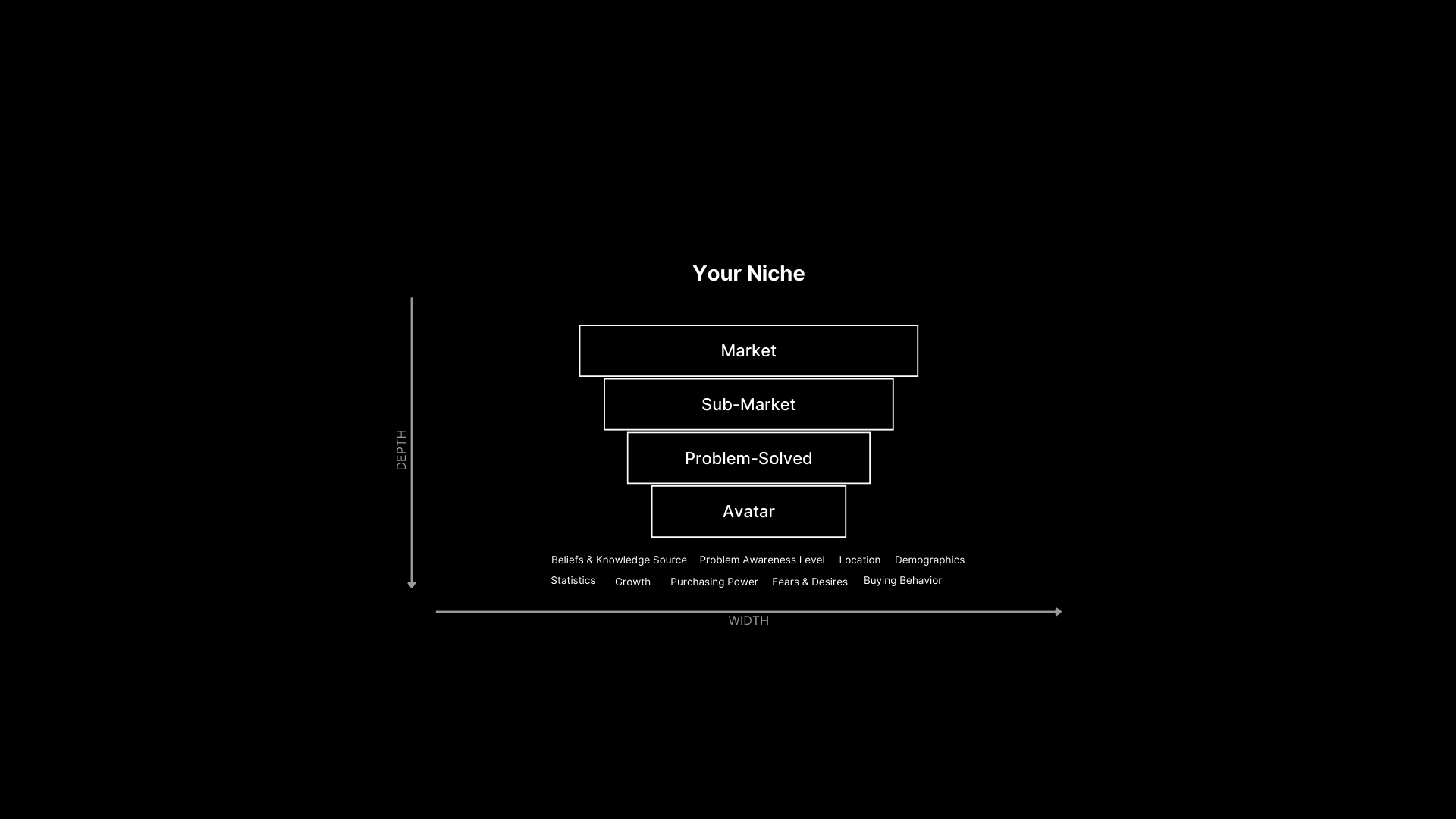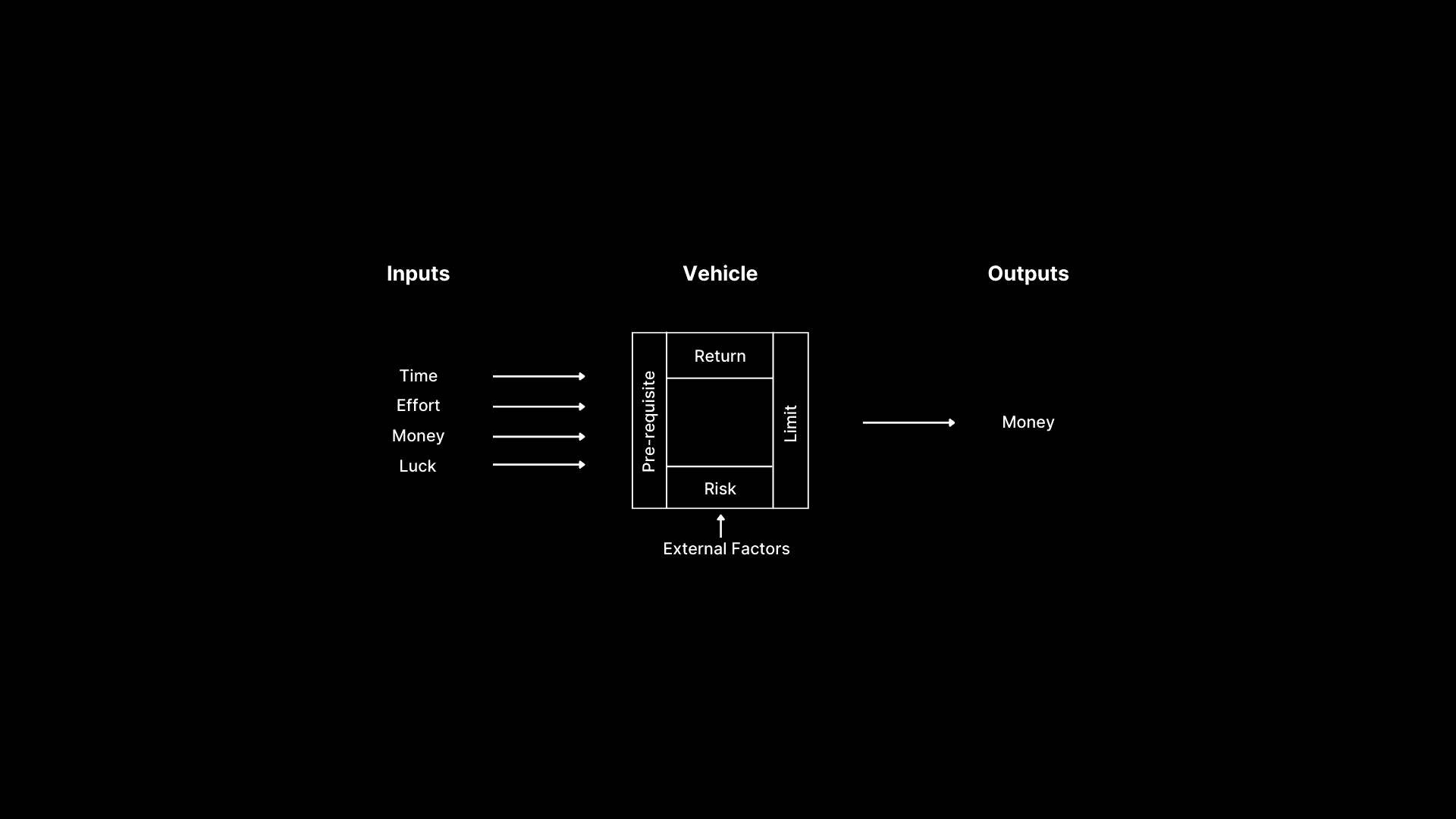#2: What business to start (your niche)
Today at a Glance
Understanding what a niche is (in a way that was never explained before)
Sharing how I learned it and how it has helped in life
Sharing steps on how to choose your own Niche (along with prompts for ChatGPT to do it for you)
The objective of this letter is to answer the most common question of "I don't know what business to start0"
Soon on Apple Podcast / Spotify
Entrepreneurs, let us talk business.
In letter #1, we discussed the money problem, you should now know how to solve it. I needed to get that out of the way so we can start talking about business in depth, which is my personal favorite and something I enjoy doing.
Here is the outline for today:
What is a niche?
How I learned and solved for it?
How you can find your niche and know what business to start?
I also included some prompts for ChatGPT to help you get this done with (I want you to leverage AI to do the heavy lifting for you in business).
There is no room for excuses, let us begin.
What is a niche?
Let us first define what the word “Niche” really means. According to Google, the word “Niche” is borrowed from Latin “nīdus” which means nest or to make nest by the old French.
In business, we use it to explain what market we are in and who we are serving, something like a business nest.
Basically, your niche is the group of people you are going after to take from where they are to where they want to be. It is very important for you to identify your niche before everything else because it will shape all your business operations that has the collective goal of providing maximum value to your market.
But there one tiny problem…
The definition I just gave you is a common one in the business world. And “common” things tend to be crowded…meaning that you do not have an advantage if you follow them because you are competing with… well, everyone else.
It makes it hard to stand out.
You know that feeling when you think of an idea and find it already done, then you just decide everything in the world is done and get stuck thinking of an idea for a long time (maybe that is you right now)?
This is what I mean, the reason you feel that is because everyone is looking at the same definition of the problem.
Here is a wild idea… lets change the definition in a way where it will work for us and allow us to dominate our market.
PS – this is a skill I learned from investing, because investing is not easy and you always need to have an edge (be different) to win in the markets.
Note: it is important to choose a niche at the early stages of your business. But I want you to understand it is okay to change your niche given you have a justifiable reason. I say this because I have seen many people have a tough time deciding where they end up doing nothing for a long time. It is fine to choose anything for now, you can always change it later, you just need to start.
And here is a fun fact that may make you feel better, many who are making millions per month tell me that they doubt their niche every single day, it is part of the process and there is a way to know whether you need to stay in or leave the niche.
Back to the question, how can I define a Niche, in a way that not many people are aware off, and will give me an advantage over others?
The answer, by adding:
Depth: market, sub-market, problem-solved, avatar
Width: avatar behavior & statistics

Let us dive into each.
Depth
In the business world, everyone agrees that there are 3 main markets which are wealth, health, and relationships. Every single business fall within one of these categories. Some have modified this definition by adding “self” as a market with the argument that “you” can be a niche in the digital world and attract similar people to “you” (I am not very convinced with that, just yet).
The problem is that if everyone just chooses between these three markets, there will be millions of businesses competing in health, wealth, and relationship. It will be impossible to stand out.
Here is where sub-markets come in. Sub-markets are markets within the main markets. Examples of sub-markets are as follows:
Wealth – business, real-estate, stocks, financial advisory
Health – fitness center, gyms, nutritionists, dentists, spas
Relationships – dating coach, marriage consulting, love language courses
But these also have become crowded in a way now after Russell Brunson popularized the idea. Let us go one level deeper, which is the problem-solved.
You can add another layer of depth here by adding the problem you are solving for a sub-market. For example,
Market: health
Sub-market: weight loss
Problem-solved: to lose weight while travelling and still enjoying the food
Market: wealth
Sub-market: stocks
Problem-solved: buying and selling stock while having no access to the internet at critical times.
You can see how depth was added when we focus on just one problem, and the beauty of this is, it becomes much easier for you to become the best at solving that problem than wealth in general.
But let us go one more level down, and add the avatar. The avatar is the person you will solve the problem for. Let us build on the previous example…
Market: health
Sub-market: weight loss
Problem-solved: to lose weight while travelling and still enjoying the food
Avatar: for Emiratis (because they eat sweets and drink coffee when they travel to Europe and come back with 10 kgs of body weight added)
Market: wealth
Sub-market: stocks
Problem-solved: buying and selling stock while having no access to the internet at critical times.
Avatar: for soldiers (because they get dispatched regularly on missions and do not have access to a computer for days)
By adding the market, sub-market, problem-solved, and avatar together, you get what is called a “hyper-niche.” And the advantages of hyper-niching down are that:
You can become the absolute best in it (no one will even come close)
You can understand your market better than 99% of your competitors (I will show you how)
You can standardize the value creation process and scale (the more general your niche is, the harder it will be for you to scale).
PS – scale is just a fancy word for “doing more what you are already doing.” Something like more customers, more sales, more people working for you, etc.
Here are some guidelines that I developed based on the people I have worked to help avoid common mistakes made when niching down:
You are not marrying your niche, so choose and just start.
When you have a niche, that does not mean you cannot serve anyone else. You can if they fit the buying criteria. But the reason why you must do this is to help you create magnetic and effective messaging (better than all your competitors) in order to suck in customers just like a vacuum.
Avoid describing the same problem-solved or avatar in different ways. For example: hopeless, lost, confused, do not know what to do engineers. Those words are all the same thing in different ways. To avoid this, think in terms of demographics and psychographics. For example, you can niche by:
Gender
Age
Marital Status
Economic Status
Interests
You can even go further by adding “how you will solve the problem” in your niche but then it will start to be too much and I have found that it is more negative than positive to go hyper niche (works in rare cases). Only use this if needed.
This is depth. Now, let us talk width.
Width
Width means getting clear about your avatar details while also being aware of what buying stage they are at in terms of problem-solution maturity. Understanding this helps you build effective marketing messages, websites, ads, and everything else to capture their attention and cut through the noise in your market. What width includes is the following:
Demographics
Beliefs & knowledge source
Problem awareness level
Purchasing power
Location
Fears & Desires
Growth
Buying Behavior (online/offline)
Statistics
For now, choose your Niche based on depth only. Adding width is the next step that requires a letter by itself. I will share the details about that and how you can exactly do it for your market later.
How I learned and solved for it?
The idea of a hyper-niche became clear to when I decided to build a cryptocurrency AI platform and was not working out as expected. It taught me lessons that helped me connect all the dots of what I did in the past and why some worked… and some did not.
Let me the share the main lessons and failures with you.
Cryptocurrency trading hyper-niche - If you were with me in this 2-year journey, you know that my every day task was to understand what the market really wants in this niche. Here is a quick run through of the sequence of events that led to me hyper-niching.
Somewhere around mid-2021, I started creating content around trading the financial markets.
On September 2021, I started a group to talk about trading and gathered the interested audience there from my social media channels.
On January 2022, I started cryptocurrency trading weekly calls and educational videos as a paid platform. The growth was nice for 4 months where I the revenue that I was making was doubling month after month, until the decline started. Here is where I looked for new ways and started understanding why that was happening.
The bear market hit in the crypto world, interest was dying out, everyone started thinking crypto is a scam, and customer acquisition costs were hitting the roof. It was a slow death of the business.
I hyper-niched down to employees only as the avatar solving the problem of leaving their 9-5, it worked and kept it steady with growing months.
Hyper-niching saved the business from going a downward spiral.
X (Formerly Twitter) hyper-niche of NFT TA for an explosive followers’ growth - I was struggling to build my followers on X and decided to narrow down my content to (wealth > trading > NFT technical analysis > for NFT traders). This grew my accounts 5x leading to names reaching out.
Space hyper-niche to ADCS - I built my name in the space industry by being an expert in one of the subsystems of the satellites we sent to space which is the Attitude Determinations and Control Subsystem (ADCS). I wouldn't have been this known in the space if I focused on the whole thing.
Now: SEYOLA business niche- I will keep this a secret for now.
I have many more examples, but the main point is that with whatever you pick for your business, think of niching down.
This is the power of the hyper-niche.
How you can find your niche and know what business to start?
Coming soon with ChatGPT prompts…

